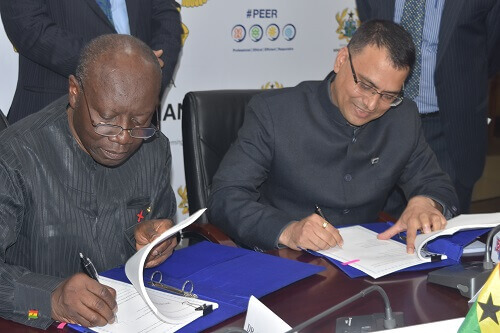After around two years of negotiating, the Export-Import (Exim) Bank of India has finally approved a $30 million line of credit (LOC) to the Ghanaian government for a drinking water supply project in Yendi, a town in north-eastern Ghana. The initiative aims to rebuild a drinking water system that has not been rehabilitated since 1941.
Work on the project began on July 29, 2020, and is being conducted by Wapcos, a private sector water and power consultancy services firm that undertakes missions under the Ministry of Jal Shakti of the Government of India.
They will begin by pumping water from the Daka River through a 25km long pipeline, where it will then pass through a water treatment plant, and then be stored in a reservoir. The project also aims to increase the ‘distribution networks’ of water supply channels by over 50km, and aims to provide residents in Yendi and the surrounding localities of Ghana, Sambu, Adobo, Sokoli, Nakpachei, Gbungbalaga, and Kuga with 15,000 m3 of water per day.
The $30 million line of credit is, in fact, part of a wider $180 million credit facility signed between India and Ghana in 2017, in which $150 million will go towards the Agricultural Mechanization Services Centers (AMSECs) project. This will provide agricultural machinery to farming households, cottage industries, and small factories.
The deal was signed by Ghanaian Finance Minister Ken Ofori-Atta and Pushpesh Tyagi, the resident representative for Exim Bank in the African continent. The deal holds an interest rate of 1.5% in a 20-year repayment plan.
The Exim Bank also extended a similar $95 million credit facility to Mozambique in 2019 for railway projects, where the funds will be used to finance the purchase of ‘railway rolling stock’, such as locomotives, coaches, and wagons. In fact, earlier this month, on August 3, the Exim Bank signed another $250 million LOC to Mozambique for a power supply project, bringing the number of credit facilities extended to the southern African nation to 14, totaling $772 million.
The Exim Bank has 264 LOCs running in 62 countries across the world, in countries spanning across Africa, Asia, and Latin America, and has put roughly $26 billion towards these ventures. It is thought that these projects serve as investments to build India’s diplomatic footprint and expand its trade routes across the globe. For instance, trade between India and Ghana increased to $1.7 billion in 2018 after first crossing the $1 billion mark in 2011.
In light of growing tensions between India and China, it remains to be seen whether India can emerge as an alternative to China over the coming decades. China has loaned upwards of $160 billion to African countries, and roughly 20% of African debt is owed to China. However, local politicians and citizenry are growing increasingly wary of this being a form of debt-trap diplomacy. In this scenario, perhaps of the long term, India can emerge as a viable alternative.
India’s Exim Bank Approves $30 Million Line of Credit for Drinking Water Project in Ghana
The project will be undertaken by Wapcos as part of the Jal Shakti mission.
August 11, 2020

Finance Minister Ken Ofori-Atta an Exim Bank representative Pushpesh Tyagi signing the agreement in 2019. SOURCE: My Ghana Online
